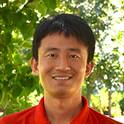
Article
Distributed Linear Precoder Optimization and Base Station Selection for an Uplink Heterogeneous Network
IEEE Transactions on Signal Processing
(2013)
Abstract
In a heterogeneous wireless cellular network, each user may be covered by multiple access points such as macro/pico/relay/femto base stations (BS). An effective approach to maximize the sum utility (e.g., system throughput) in such a network is to jointly optimize users' linear procoders as well as their BS associations. In this paper, we first show that this joint optimization problem is NP-hard and thus is difficult to solve to global optimality. To find a locally optimal solution, we formulate the problem as a noncooperative game in which the users and the BSs both act as players. We introduce a set of new utility functions for the players and show that every Nash equilibrium (NE) of the resulting game is a stationary solution of the original sum utility maximization problem. Moreover, we develop a best-response type algorithm that allows the players to distributedly reach a NE of the game. Simulation results show that the proposed distributed algorithm can effectively relieve local BS congestion and simultaneously achieve high throughput and load balancing in a heterogeneous network.
Keywords
- base station selection,
- heterogeneous networks,
- nash equilibrium,
- noncooperative gams,
- precoder optimization
Disciplines
Publication Date
June, 2013
Publisher Statement
This is a manuscript of an article from IEEE Transactions on Signal Processing 61 (2013): 3214, doi: 10.1109/TSP.2013.2252169. Posted with permission.
Citation Information
Mingyi Hong and Zhi-Quan Luo. "Distributed Linear Precoder Optimization and Base Station Selection for an Uplink Heterogeneous Network" IEEE Transactions on Signal Processing Vol. 61 Iss. 12 (2013) Available at: http://works.bepress.com/mingyi_hong/8/
